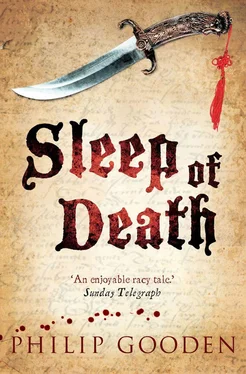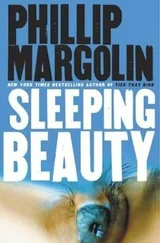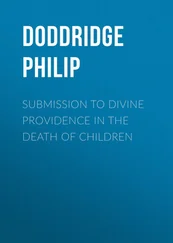Philip Gooden - Sleep of Death
Здесь есть возможность читать онлайн «Philip Gooden - Sleep of Death» весь текст электронной книги совершенно бесплатно (целиком полную версию без сокращений). В некоторых случаях можно слушать аудио, скачать через торрент в формате fb2 и присутствует краткое содержание. Год выпуска: 0101, ISBN: 0101, Издательство: Constable & Robinson, Жанр: Исторический детектив, на английском языке. Описание произведения, (предисловие) а так же отзывы посетителей доступны на портале библиотеки ЛибКат.
- Название:Sleep of Death
- Автор:
- Издательство:Constable & Robinson
- Жанр:
- Год:0101
- ISBN:9781472104311
- Рейтинг книги:5 / 5. Голосов: 1
-
Избранное:Добавить в избранное
- Отзывы:
-
Ваша оценка:
- 100
- 1
- 2
- 3
- 4
- 5
Sleep of Death: краткое содержание, описание и аннотация
Предлагаем к чтению аннотацию, описание, краткое содержание или предисловие (зависит от того, что написал сам автор книги «Sleep of Death»). Если вы не нашли необходимую информацию о книге — напишите в комментариях, мы постараемся отыскать её.
Sleep of Death — читать онлайн бесплатно полную книгу (весь текст) целиком
Ниже представлен текст книги, разбитый по страницам. Система сохранения места последней прочитанной страницы, позволяет с удобством читать онлайн бесплатно книгу «Sleep of Death», без необходимости каждый раз заново искать на чём Вы остановились. Поставьте закладку, и сможете в любой момент перейти на страницу, на которой закончили чтение.
Интервал:
Закладка:
And when the plague came to our region who should it strike but those who would have no truck with players and playhouses? I mean the good, honest, simple folk of my village. My mother and father were included in that number.
I came over the brow of the hill. It was a fine spring morning. The last traces of frost lingered under hedges and in the ruts on the track, but the air was soft with the promise of better times. I had failed in my attempt to join the touring players and had been walking from Bristol since three that morning. I should have been returning tired and with my tail between my legs but, perversely, I felt fresh and cheerful. In the distance was the glint of the Bristol Channel and, beyond, the hills of wild Wales stood out in the bright air. Down below was my village of Miching. I wondered what my father would say to the prodigal’s return. He would be glad I had not fallen among the sinful players but, humanly, he would wring my hand in sympathy at my disappointment. My mother, she would say nothing. I took one last look around from the heights and then plunged downhill. In the distance at the bottom of the valley was the cluster of cottages and huts separated by thread-like paths, the church and the manor house a little distant from the common people, the scattered farmsteads, everything that, together, went by the name of Miching.
I had made a few dozen downhill strides when, without knowing why, I stopped. There was something wrong. I paused, and shaded my eyes from the sun to see better. The village lay still. I even sniffed the air like an animal scenting danger. Nothing. I went another few steps and halted once more. Then it came to me: what was wrong was that there was nothing to see, nothing to hear, nothing to smell. On a morning like this, the beginning of a fine spring day, there should have been people moving in the fields or on the outskirts of the village, the occasional shouted greeting or question, the smell of woodsmoke curling out of the valley, the bleating of sheep. But there was absolute stillness and silence.
My heart beating faster, and with a sick feeling, I leapt down the path. At one point the track ran out of sight as it looped an outcrop of rock, and it was on the far side of this that I found a man sitting with his head in his hands. Roused by my panting and the thud of my feet, he looked up and I recognised him as my father’s sexton, a thin bony man, an appropriate shape for his principal business, I had always felt. I spoke his name. After a moment he came to himself and saw who I was.
‘Nicholas,’ he said in a spiritless voice.
‘What’s happened? Why are you here, John?’
He said nothing for a while but hung his head again, and pressed his hands into sunken cheeks. Then in a mumble he said, ‘Your father sent me here.’
‘Why? What for?’
But I knew already. There is only one cause for such a profound silence and stillness. The plague had struck villages to the east of us in previous years, and even Bristol had known it. It is a tide that creeps inexorably across the land, winter and summer, drowning without distinction young and old, rich and poor, though — unlike the tide — it leaves some spots and areas uncovered. So, in a city, one household will fall victim while its neighbour remains untainted. And yet the plague is a beast too, one that will abandon his orderly progress across country and suddenly overleap many places to land in a distant village or town. Then he will jump sideways or seven miles backwards, and all to confound expectation.
‘I was stationed here to warn people away,’ he said.
How like my father, to think not only of his own flock but of the well-being of the neighbouring parishes.
‘And to stop our own people from leaving,’ he said.
‘My father. . and my mother. . they are helping those in distress?’
‘You cannot go down, Nicholas. I am empowered to stop you and all travellers.’
He spoke by rote. He could scarcely have turned an ant from its path. I was already past him. Then he called out my name, the clearest he had yet spoken, so I paused once more.
‘You will go. But what you will see will be a sermon to you. It is a speaking sight, and the voice it calls us with is a loud one, to call us all to repentance.’
I turned my back on him and went on down the track. As I neared the flatter ground I slowed down. I was desperate to see my parents, and to know that they were all right, but at the same time I was conscious of the risk I ran in entering a plaguey place. It was not self-preservation, or not entirely, but a more cautious mood overtook me as I grew breathless after my downhill dash. Nevertheless I proceeded past the outlying farms and cottages at the ends of fields. This was a well-known route from the earliest days of my childhood, but now it seemed horribly unfamiliar. The first promise of the morning light as I crested the hills above my home had been replaced by terror.
As I came nearer to my village of Miching I saw deserted streets; and as I came within sight of the first houses I found what I knew I would find: many of the doors marked in the centre with red crosses, and sometimes with the words ‘Lord have mercy upon us’ set closely and neatly by the cross. Somehow this was the worst thing I had seen so far, not the crosses and the words themselves but their precision. There was no sign of haste or panic in the sign or the lettering. It was as if each sign had been painted by a craftsman with all the time in the world at his disposal. I paused in the main street. The church was around the corner at the far end. My parents’ house was close by it. I waited to catch my breath. In truth, I didn’t know what to do next. I wanted to cry out but no words came and I was afraid to break the silence.
Then I heard, off to my left, the faintest thump. A delay of perhaps half a minute, then the noise was repeated. I dithered. I did not want to go down the narrow muddy lane that led towards these sounds but, of course, I did go. On the way there were more doors with their neat crosses and pleas for grace. It was important to me to remember the name of this lane as I walked down it with dragging steps and I struggled to think, and yet I could by no means recall it. (Only now, lying in bed next to my whore Nell, do I remember what it was called by the villagers: Salvation Alley, and that not through any connection with the church but because there was a woman named Molly who lived at the bottom and who was reputed to sell herself. I do not know if it had a proper name.)
Beyond this muddy lane was an open patch of ground and when I entered on this area I discovered the source of the thumping noises. There was a cart on the far side of the green. A horse stood lonesome and patient between the shafts. By the back of the cart a great black pit had been dug. Three muffled figures were engaged in tugging and pushing at bodies heaped in the back of the cart. They used staves with a kind of cross-piece at the top. A corpse would topple into the pit, there would be a pause while one of the burial-men fiddled below with his stave — presumably to fork the body into a satisfactory position in the pit — and then another would be toppled down. Some of the bodies were swaddled in linen and some in rags only. Some were so loosely wrapped that they might as well have been naked, for their coverings fell away as they descended from cart to pit. Little did it matter to the corpses whether they fell clothed or unclothed into the common ground; little did it matter to the burial-men. But tears started to my eyes at this indiscriminate heaping together, as one might call it, of my father’s parishioners. Prosperous and poor, reputable and ne’er-do-well, industrious and idle, young and old, man and woman and child (for some of the bundles were not full size), all made their brief passage through the air from cart to ground without distinction.
Читать дальшеИнтервал:
Закладка:
Похожие книги на «Sleep of Death»
Представляем Вашему вниманию похожие книги на «Sleep of Death» списком для выбора. Мы отобрали схожую по названию и смыслу литературу в надежде предоставить читателям больше вариантов отыскать новые, интересные, ещё непрочитанные произведения.
Обсуждение, отзывы о книге «Sleep of Death» и просто собственные мнения читателей. Оставьте ваши комментарии, напишите, что Вы думаете о произведении, его смысле или главных героях. Укажите что конкретно понравилось, а что нет, и почему Вы так считаете.












